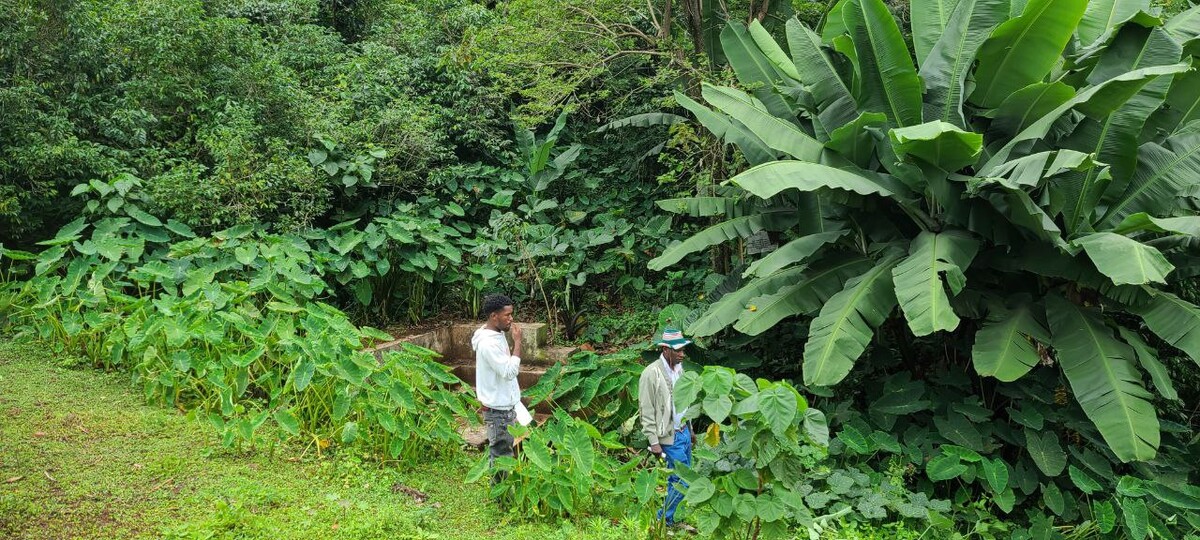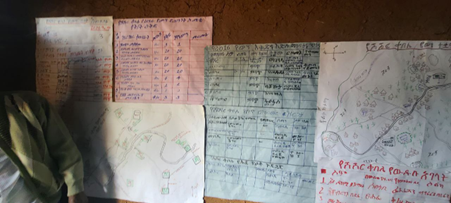South Ari District exemplifies its efforts in strengthening WASH systems to the Joint Technical Review (JTR) mission.
Published on: 11/06/2024
IRC WASH has been supporting South Ari district since 2017 to strengthen its WASH system. The district’s progress has been highlighted on various national level platforms. As part of the preparation for the 12th Multi-Stakeholders Forum (MSF 12), a joint technical review (JTR 14) mission visited the district to learn from the achievements and challenges. The mission expressed appreciation for the district’s presentation and implementation efforts.

The Ari zone and South Ari district have given a comprehensive overview presentation of the WASH status in households, health care facilities and schools. The mission members appreciated the presentations. Feruz Teferi, remarked that the comprehensive presentation indicates the presence of a strong sector coordination at zone and district levels.
The South Ari District utilises an mWater, a cloud-based data management system, to manage its drinking water assets. The data is updated on a monthly basis. For nonfunctional systems, details regarding functionality and costs associated with corrective maintenance are accessible through the system. During the site visit, the team was engaged with Shishiri Kebele (local administrative area) water user federation-one of the 31 federations in the district. The federation’s office was constructed through community participation. Notable, information related to drinking water in the kebele is prominently displayed on the wall. The federation maintains an effective filing system, providing regular reports on scheme status, tariff collection and expenditures to the district water office. Monthly meetings are conducted, and minutes are recorded in a dedicated file. This exemplary approach served as a valuable lesson to be shared with others.
The South Ari district has formulated a 10-year WASH master plan. From this long-term plan, the WASH sector offices derive their annual plans. Annually, the master plan is reviewed, taking into account the performance of the previous year and adjusting the remaining outstanding activities for the subsequent years. Importantly, the master plan serves as a tool to prioritise unserved and underserved kebeles for new construction, thereby promoting geographic equity.
Despite resource constraints, hindering the full implementation of the master plan, the district benefits from strong community participation. Locally available construction materials, labour and financial contributions play a pivotal role in providing services to previously unserved communities, maintaining non-functional systems, and generating revenue for operation and maintenance. Notably, the practice of upfront community contributions, covering up to 50% of construction costs, has become ingrained in the district’s culture when requesting the construction of new water supply facilities.
Tinishu Tekele, Head of Ari Zone Water and Energy Department, emphasised the community’s commitment to supporting new construction and rehabilitation efforts. This commitment extends to constructing access roads, transporting materials using animals when human labour for road construction is challenging, and contributing cash and locally available materials.
He also said, the region has shifted its policy toward prioritising gravity-based water systems over motorised ones, even if the water source is at a distance. The cost and operational challenges associated with electromechanical equipment make gravity systems a more feasible option for the community. Given the current financial constraints, the region’s focus lies in ensuring the sustainability of existing systems and converting diesel driven systems to solar power. Additionally, he said there is a pressing need to prioritise water supply, to enhance education and health outcomes.
Ato Tinishu highlighted the widening gap between demand and the government’s capacity to provide services due to inflation. Consequently, achieving full implementation of the master plan faces significant challenges.
In Shishir Kebele, the water user’s federation took the initiative to construct its own office, with labour and construction material contributions from the community. This office is shared by both the federation and the water safety plan (WSP) team. Notably, they maintain a well-established filing system, meticulously documenting all information related to the water supply in the kebele.
Their records include copies of monthly reports sent to the district water office, a list of improved and unimproved water sources with their locations, the number of beneficiaries served, functionality status, and risks associated with the quantity and quality of water sources. Additionally, maps of water sources and associated potential risk factors are available.
Despite information challenges faced by other districts, Shishir Federation diligently sends monthly reports to the district water office. Furthermore, they conduct regular supervision visits to each scheme within the kebele three times a year to assess fencing status and safety measures. The federation also plays a crucial role in coordinating community contributions for new construction and rehabilitation efforts.

Shishir Kebele’s water safety plan demonstrated their commitment
IRC WASH actively supports the implementation of water safety plans, and this remains an ongoing endeavour. Hailu, the Chair of Shishir Kebele Federation and a member of the water safety plan team, briefed on the sanitation situation in the area before receiving training from IRC WASH. At that time, improved latrines were virtually unknown in the kebele. However, following the training, over 60 households constructed their own improved latrines, and more than 40 households upgraded their unimproved latrines by installing a washable slab. Some even fitted Sato pans.
Notably, the administration of Shishir School promptly upgraded the school toilet to a washable slab after learning about the benefits from the water safety plan team. However, a health extension worker and WSP member, highlighted the challenge of installing Sato pans in institutional toilets due to water requirement-many institutions lack reliable water supply.
The WSP team diligently mapped all water sources and associated risks. After mapping, their recommendations led to practical interventions. For instance:
The team appreciated the collaboration between the district WASH stakeholders and IRC, the database management systems both at district and kebele level, the use of water safety plan to increase demand for improved WASH services and the contribution of the community for improving WASH service provision. As a suggestion, the team underscored the need to scale up the initiative at the district level to zone, region and national levels.
The Multi-Stakeholders Forum (MSF) is an annual event jointly organised by WASH sector actors, including government, development partners, and nongovernmental organisations. The main objective of the MSF is to review progress, identify gaps and priorities, and collectively agree on actions to enhance sector performance. The MSF was launched in 2006, and since then 11 MSFs have been conducted. Typically, the event occurs on an annual basis, with few exceptions.
Prior to the MSF, an essential preparatory activity is the joint technical review (JTR). The JTR aims to assess the implementation progress of WASH programs in selected geographic areas. These insights contribute to shaping national level strategic directions that sector actors can prioritise to enhance program implementations in the years ahead.
At IRC we have strong opinions and we value honest and frank discussion, so you won't be surprised to hear that not all the opinions on this site represent our official policy.